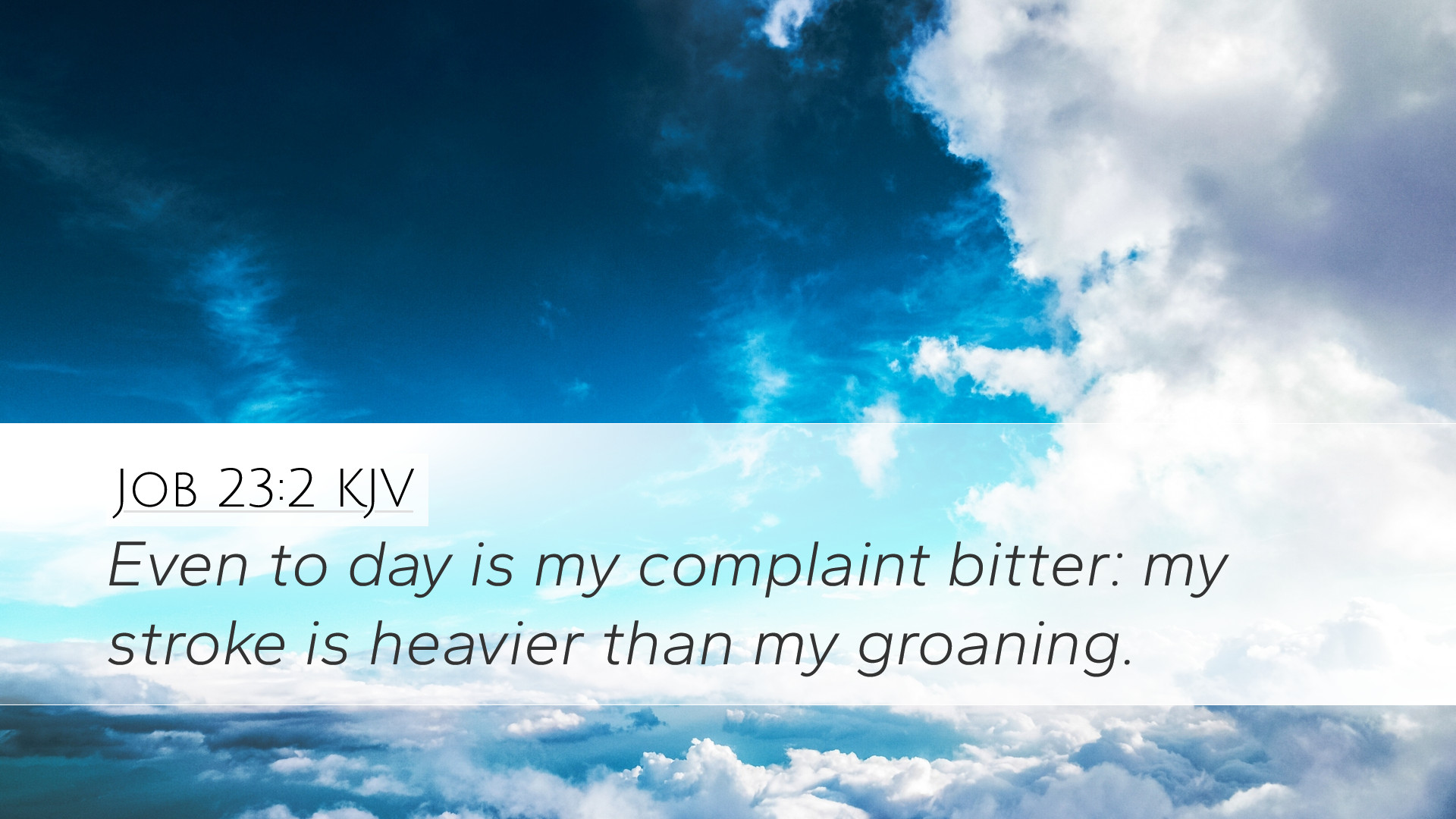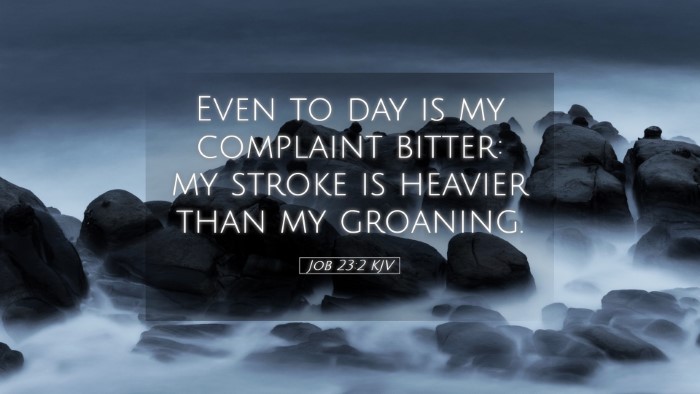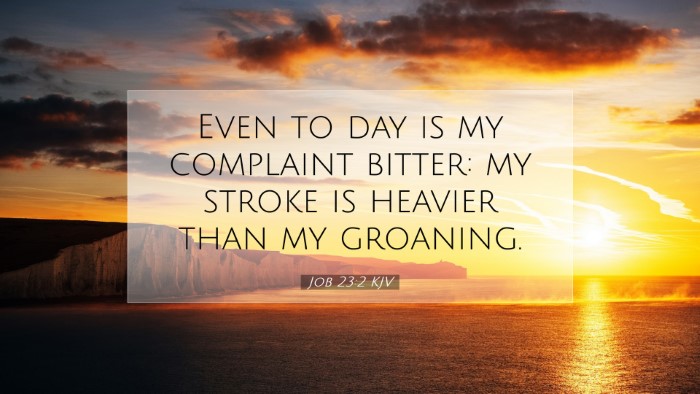Old Testament
Genesis Exodus Leviticus Numbers Deuteronomy Joshua Judges Ruth 1 Samuel 2 Samuel 1 Kings 2 Kings 1 Chronicles 2 Chronicles Ezra Nehemiah Esther Job Psalms Proverbs Ecclesiastes Song of Solomon Isaiah Jeremiah Lamentations Ezekiel Daniel Hosea Joel Amos Obadiah Jonah Micah Nahum Habakkuk Zephaniah Haggai Zechariah MalachiJob 23:2
Job 23:2 KJV
Even to day is my complaint bitter: my stroke is heavier than my groaning.
Job 23:2 Bible Commentary
Commentary on Job 23:2
Verse Reference: Job 23:2 - "Even to this day is my complaint bitter: my stroke is heavier than my groaning."
This verse comes from the dialogues of Job, who is in deep distress, expressing his anguish and sorrow as he contemplates the seeming absence of God in his suffering. The commentary on this verse highlights both the emotional depth of Job’s lament and the theological implications of his feelings.
Contextual Overview
The Book of Job is a profound exploration of suffering, righteousness, and the nature of divine justice. Job, a man of integrity and faith, finds himself facing unexplainable suffering. The dialogues between Job and his friends offer insights into human suffering, as well as God's sovereignty and wisdom.
Insights from Matthew Henry
Job's Complaint: According to Matthew Henry, Job’s complaint reflects the intensity of his inner turmoil. The phrase, "my complaint is bitter," signifies that Job feels a great weight on his heart, stemming from both his physical afflictions and his spiritual desolation. Henry emphasizes that Job’s sorrow is not merely a reaction to his losses, but also arises from a feeling of abandonment by God.
The Nature of Suffering: Henry suggests that Job's suffering is multi-faceted; it encompasses physical, emotional, and spiritual dimensions. He notes that the 'stroke' Job refers to can be interpreted as both a personal affliction and a divine chastisement, indicating the complexity of understanding God’s will in times of distress.
Reflections from Albert Barnes
The Weight of Suffering: Albert Barnes elaborates on the idea that Job’s 'sorrow' is more than just personal grief; it is a struggle against the silence of God amidst suffering. Barnes argues that this silence amplifies Job’s despair, leading him to feel as if his pain exceeds his capacity to articulate it—a notion underscored by "my stroke is heavier than my groaning."
Seeking God: Barnes points out that Job’s desire to confront God concerning his plight demonstrates both faith and desperation. He desires an audience with God to plead his case, highlighting the relationship between human suffering and divine justice. Job’s anguish reveals a deep yearning for understanding and communion with the Divine.
Insights from Adam Clarke
Job's Undeterred Faith: Adam Clarke brings forth the idea that despite the depth of his suffering, Job maintains a resolve to seek God. Clarke interprets Job's complaint not just as a cry of hopelessness, but as an expression of faith. He recognizes that even in distress, Job seeks to approach God, which underscores the enduring relationship between humanity and the Divine.
The Concept of Divine Justice: Clarke discusses the broader implications of Job's sufferings, emphasizing that Job’s circumstances challenge the traditional understanding of divine retribution. His plight serves as a theological discourse on the nature of suffering and justice; even the righteous may suffer and, at times, unjustly.
Theological Implications
Human Experience of Suffering: The collective insights from these commentators lead us to understand that suffering is a universal human experience. It raises profound questions that challenge one's faith yet can also strengthen it. Job’s experience invites theologians and pastors to explore the mystery of suffering while affirming that it can lead to deeper faith even amidst despair.
God’s Presence in Trials: A significant theme in the commentaries is God’s seeming silence in times of suffering. While Job feels abandoned, the narrative suggests that even in silence, God is present, ultimately guiding Job towards restoration. This complexity should encourage believers to seek God actively during hardships, trusting in His unwavering presence.
Conclusion
Job 23:2 serves as a poignant reminder of the struggles faced by the faithful amid suffering. Through the combined insights of Matthew Henry, Albert Barnes, and Adam Clarke, it is clear that wrestling with God during times of distress can lead to profound theological reflection and personal growth. Job embodies the struggle of many believers who, in their darkest hours, seek not only to voice their pain but also to encounter the divine in the midst of it.
In the complexities of life’s trials, this verse and its commentaries call on us to embrace our own struggles with faith, acknowledging both our pain and God's sovereign wisdom.


